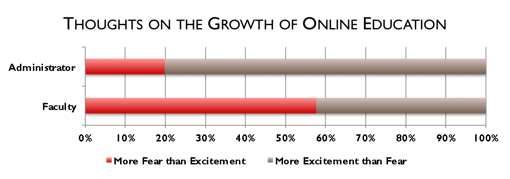
What are the implications of the Inside Higher Ed report on online teaching?
In Part 1 of this post, guest blogger Jennifer Woodruff Tait laid out some of the conclusions of a study that Inside Higher Ed has conducted about administrator and faculty views of online education. In this follow-up, she suggest some questions that board members and administrators should be asking about online education.
First, some general conclusions:
- Faculty are not luddites. Many already teach online; some enjoy it. Many find that academic learning and a sense of community can be formed among online learners if the task is approached with intentionality.
- Faculty are less optimistic than administrators. Faculty warn that educational outcomes are not always good, that online education is not a panacea for higher education, and that faculty who teach online are not always fairly compensated.
- Quality costs money. If an institution wants a high-quality online program, it needs to invest the time and money necessary, just as it would in a face-to-face setting. And administrators would do well to listen to the realistic descriptions and goals expressed by those who are actually doing the teaching.
What questions should board members and administrators be asking as they consider whether to plunge deeper into online education? Here are a few:
- Teachers and evaluation. What does online education look like at my institution? Who does it? How well are they paid? How are courses evaluated? How do outcomes compare to residential courses?
- Faculty/administrator divide. What are my institution’s goals for online programs? How do the administration’s and board’s goals compare with those of faculty?
- Faculty workload. How are online courses assigned to faculty? Is every faculty member expected to teach in the online program or do the online educators self-select? Do faculty receive course release time or other compensation to develop classes? Who is developing the curriculum?
- Listening to faculty in the trenches. What reservations have faculty expressed about the online program? What ideas do they have for improving it? How have these reservations and ideas been dealt with and discussed?
What other questions do you think boards should ask about online theological education?
Guest blog post by Jennifer Woodruff Tait